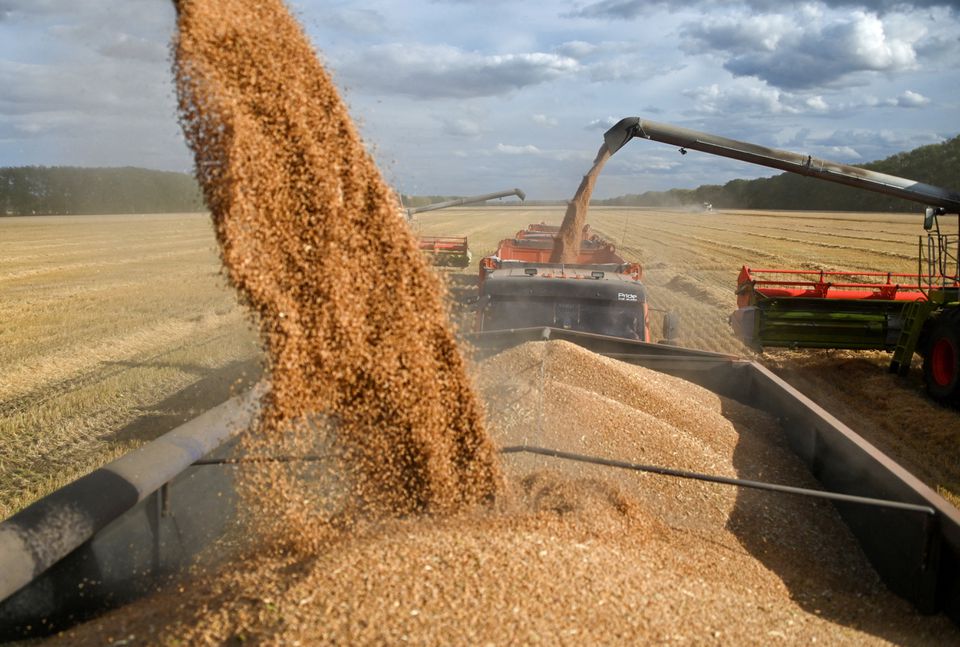Russia expressed its willingness to adjust the terms of its grain deal with Ukraine that was brokered by Türkiye and the UN to ensure more food supplies reach the poorest countries in Africa and Asia.
In his interview with Russian journalists following talks with Turkish officials in Istanbul on Monday, Deputy Foreign Minister Sergey Vershinin explained that the Black Sea deal needs improvements since, according to him, grain is now being supplied to countries that he described as "quite developed and wealthy”.
“We believe that adjustments are needed,” Vershinin said. “After all, initially the goal of the efforts made by both the UN Secretary-General and the President of Turkey was, I repeat, to help the poorest countries.”
The deputy foreign minister recalled that the landmark deal that guarantees the safe passage of commercial ships from Ukraine through the Black Sea “was reached under the slogan of ensuring food security in the first place, the poorest countries in Asia, Africa and Latin America.”
The Black Sea grain deal guaranteeing the safe passage of commercial ships from Ukraine through the Black Sea has been extended for four months on November 17. Prior, Russia pulled out of the Türkiye-brokered deal in late October, arguing that it could not guarantee safety for civilian ships crossing the Black Sea because of alleged drone attacks on the Crimean city of Sevastopol carried out by the Ukrainian forces. Ukraine has denied the accusations, saying they were based on false pretexts. Moscow’s statement prompted speculations of reigniting a global food crisis.
Shipments via the Black Sea resumed in early August after ministers from Ukraine and Russia each inked separate but identical grain-and-fertilizer export agreements in Istanbul on July 22. The landmark agreement, brokered by Türkiye and the United Nations, permitted Ukrainian grain exports to restart through the Black Sea ports. Exports were initially stopped when Russia launched what it called a “special military operation” on February 24. Millions of tonnes of grain were trapped in the country’s silos, causing a surge in food prices and sparking fears of a global food crisis.
As part of the deal, Ukraine resumed grain exports through its ports in the Odesa region, while Moscow secured guarantees for its own grain and fertilizer exports.
Ukraine and Russia are both significant food suppliers, accounting for 29 percent of wheat exports and 80 percent of sunflower exports globally, which are transported mainly through the Black Sea.
Ukraine, known as one of the world's breadbaskets, is a top grain supplier to dozens of developing countries. Last year, the country's grain exports totalled $12.2 billion, accounting for nearly a fifth of the country’s total exports. Prior to the war, Ukraine exported 98 percent of its cereals and oilseed via the Black Sea, at a rate of up to 6 million tonnes per month. But with the ports blocked and the railway system unable to cope with the extra volume, the country was only exporting between 1-1.5 million tonnes a month.







 The number of evacuees from flooded areas in Kazakhstan has reached 97,852 people, including about 32,856 children since March 27.
The number of evacuees from flooded areas in Kazakhstan has reached 97,852 people, including about 32,856 children since March 27.
 The Islamic holy month of fasting, Ramadan comes to an end this week with the celebration of a joyous festival called Eid (meaning “festival” in Ar...
The Islamic holy month of fasting, Ramadan comes to an end this week with the celebration of a joyous festival called Eid (meaning “festival” in Ar...
 Iran's senior military leaders described the drone and missile attack on Israel on April 14 night as “successful".
Iran's senior military leaders described the drone and missile attack on Israel on April 14 night as “successful".
 Azerbaijan officially unveiled the logo for the upcoming 29th session of the Conference of the Parties to the United Nations Framework Convention o...
Azerbaijan officially unveiled the logo for the upcoming 29th session of the Conference of the Parties to the United Nations Framework Convention o...



